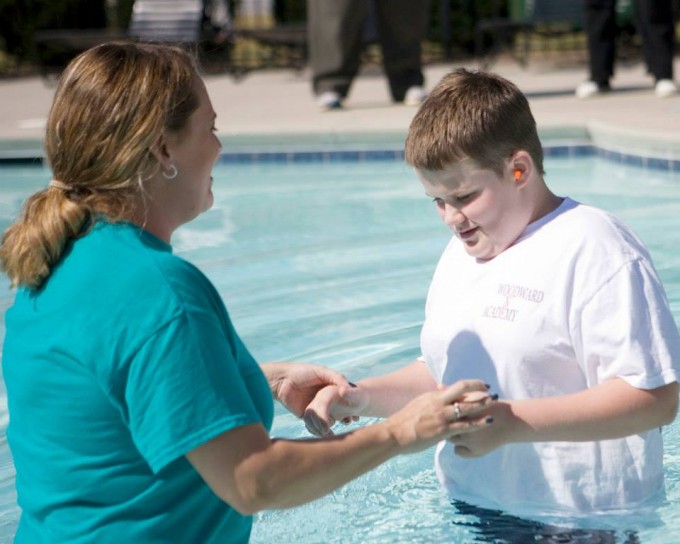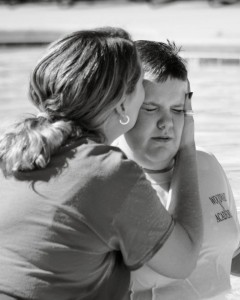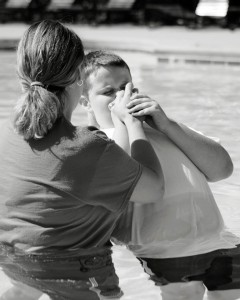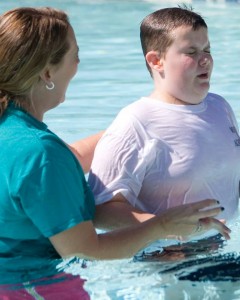Come and Die
Posted on November 27, 2013

Read one PURE mom’s reflections on how her son understood his decision to be baptized.
We have been talking with Noah for years about baptism. We probably started when he was about eight or nine years of age. All the rest of the kids his age were starting to make the decision to “give their life to Jesus,” so we assumed Noah would be excited to do so as well. After all, he has always been more at home in water than dry land so fear of drowning wasn’t an issue. He had heard all the stories, could give all the correct answers and say all the right things. So what was holding us back?
But Noah was unequivocally uninterested. More than that, he promptly shut down any conversation about Jesus that led to his own immersion in the waters of baptism. I would ask if he believed “in Jesus.” Noah would look at me strangely. I would elaborate. “Noah, what do you believe about Jesus?” He said, “Well, he was Jesus.”
So I got very specific. “Noah, what do you know about Jesus? What was true about him?” Suddenly he could converse about Jesus’ love for people, his compassion, miracles, healings, the Virgin Birth, his death on the cross – all of it.
This once frustrated me. But I think, after some research, I understand why. Paul Collins, in his book Not Even Wrong, chronicles autism throughout history. A historian and the parent of an autistic son, he describes these disparate views as “not even wrong.” He writes,
Wolfgang Pauli used to deride colleagues in theoretical physics who disagreed with him as ‘not even wrong’. He meant this as a put down – that the questions they were asking were so off-base that their answers were irrelevant. Yet Pauli’s notion could also be applied to those who are autistic. They do not respond in expected ways to questions or to social cues…but then, only a person working from the same shared set of expectations could give a truly wrong answer. The autist is working on a different problem with a different set of parameters; they are not even wrong.
Here is what I came to understand. Noah did not necessarily think he should have a personal “point of view” about Jesus. Our expectation is that people come to “accept Jesus as their Lord and Savior.” For Noah, Jesus is who he was. I don’t think he has a sense of urgency to develop an opinion about something that is, to him, a fact.
Still, Noah’s fear plagued me. He finally asked us just last weekend if we thought autistic people would “go to hell” if they weren’t baptized. We knew he was very close to a decision about what it would mean for him if he did not make a choice to do this. My husband took a very different approach as we continued this conversation.
He said, “Noah baptism is a symbol. Just like the icons on your ipad are symbols. When you open that symbol, you know what kind of program you are going to find there. Baptism is a symbol to everyone that you are a Christ follower. If people were to spend time around you and get to know you and kind of ‘open you up’ like that icon, they would see a person who believes in Jesus and wants to follow him.”
Noah replied, “Then I want to do that symbol. I want to do it this Sunday.”
We practiced giving his confession and prepared him as best we could for the freezing waters of our apartment pool – since our church doesn’t have a baptistery. I asked Noah what strategies he would need to make this less stressful, like his earplugs or swim mask. He said, “Earplugs are fine but I’m not wearing my swim mask. I’ll just have to get water in my face. This is not swimming. It is a symbol.”
When all was said and done, later that night Noah began to cry during dinner. Tenderly I pulled him aside and asked him what was wrong. He tearfully explained that he was afraid of what would happen now. He said, “Now that I follow Jesus what if something happens and I die? What if you die?”
I couldn’t understand his sudden panic. I reassured him that I was not sick and planning to die anytime soon. I re-explained that baptism had been a symbol of how we live, not just of what happens after we die. Then he said, “But following Jesus is hard. We might die. I don’t want you to die yet. I don’t want to die yet. But now I am following him so I have to. Now I am a symbol.”
Then I realized that Noah had really internalized Jesus’ command to “follow me” – a call to come and die. Die to yourself and anything you want that stands in the way of kingdom. A call to die to our desires and motives and, instead, live for his plans for our life. Die to comfort and security and embrace faith in the unseen. Die to our own fears and live as a symbol of Christ to the world.

It took Noah longer to get here than I probably would have liked. But when he arrived, boy did he arrive! I think Noah fully comprehends the way of the cross in ways I might like to try and forget. When he repeated that Good Confession yesterday, he completely embraced a way of life that not only means living follower of Christ daily, but also living alife marked by a symbol of death.
After all, he did bid us come and die.


